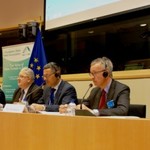07-April -2016 - This week the European State Forest Association (EUSTAFOR) celebrated its 10th anniversary of cooperation among state forest organizations at European level with a conference, an exhibition, a forest food reception and a forest excursion under the common title “Managing European Forests Responsibly - for People, Climate and Nature.”
The conference was organized in the European Parliament (EP) under the auspices of the three Chairs of the EP Committees which are the most relevant for the forest sector, namely: MEP Czeslaw Adam Siekierski (Committee on Agriculture and Rural Development), MEP Giovanni La Via (Committee on Environment, Public Health, Food Safety) and MEP Jerzy Buzek (Committee on Industry, Research and Energy). MEP Paul Brannen (S&D/UK) co-hosted the event. Several presentations were made, followed by a stakeholder panel discussion during which the potential of European forests to contribute to the goals set out by the EU’s 2020 strategy, the EU’s 2030 climate and energy framework and the Paris Agreement (COP-21) were highlighted.
MEP Siekierski referred to the role of forests in protecting water resources as well as being an important contributor to the development of rural areas. He announced the upcoming work of the three committees on their joint report regarding the EU Forest Strategy.
MEP La Via stated that managed forests have a higher capacity to sequester carbon than unmanaged forests. He also pointed out that forest fires and other damage can be prevented by properly designed management practices.
MEP Buzek underlined that forests have a great potential to contribute to the bioeconomy and the circular economy and that industry and forest policies must be designed horizontally.
Prof. Gert-Jan Nabuurs (Wageningen University, Netherlands) delivered the keynote address about the new role for forests and the forest sector in achieving the EU post-2020 climate targets. He pointed out that European forests are currently a sink for 10% of the EU’s total emissions and that there is an additional 9% CO2 mitigation potential if the carbon storage of forests is increased by applying so-called climate-smart forestry practices. State forests can play a significant role. They are large entities who manage substantial areas and are capable of providing many examples of climate-smart management practices.
Prof. Tomasz Zawiła-Niedźwiecki, Deputy Director General of the Polish State Forests, explained how climate change influences daily management practices. He presented the concept of “Forest Carbon Farms” that can serve as a functional network of areas promoting forest management activities which enhance CO2 mitigation efforts. Prof. Zawiła-Niedźwiecki highlighted that additional forestry activities play an important role in increasing greenhouse gas removals and that national legislation and monitoring systems should enable the experimental marketing of removal units.
Mr. Humberto Delgado Rosa, Director Natural Capital, European Commission (DG Environment) stated that biodiversity and forest management can be reconciled if sustainable forest management is practiced. Forests are Europe's largest type of ecosystem in a relatively natural and semi-natural state. Around 1/4 of the EU’s forests is part of Natura 2000. He quoted the State of Nature in the EU report (2015) according to which most forest types and forest-related species are in an unfavorable conservation status. Mr. Delgado Rosa stated that forest owners and managers need to be encouraged and rewarded for keeping up sustainable and multifunctional forestry that also offers green job opportunities and enhances biodiversity.
MEP Miapetra Kumpula-Natri said the bioeconomy was an effective tool against climate change and noted that state forests play a key role in the bioeconomy. Wind and solar energy are very important but 25% of renewable energy comes from biomass derived mostly from forests. Decarbonization of the economy and the energy union are not possible without biomass. Ms. Kumpula-Natri emphasized that the EU’s bioeconomy should primarily be built on domestically-produced raw materials and called for a policy framework that attracts investments.
MEP Paul Brannen, Harald Mauser (EFI), Luc Bas (IUCN), Fanny-Pomme Langue (AEBIOM) and Pekka Pesonen (Copa-Cogeca) joined in subsequent panel discussion which tackled the following questions: Should Europe increase the production and use of wood raw materials? How can biodiversity and other ecosystem services be maintained if, for climate reasons, forest production is increased? What would be the best solution for forestry in the EU’s post-2020 climate change policy?
Per-Olof Wedin, EUSTAFOR’s President, stated that over the past 10 years EUSTAFOR contributed with state forests’ experience and knowledge to the EU’s major forest-relevant policy developments. Today, EUSTAFOR would like to offer its views on how state forests can boost the bioeconomy and how sustainable forest management can contribute to other policy developments driven by the need for climate change mitigation and adaptation.
The conference was followed by the opening of an exhibition by MEP Nils Torvalds (ALDE/Finland). The exhibition was on display during the entire week in the European Parliament and presented different aspects of sustainable and multifunctional forest management in European state forests.
Both events were organized with the support of the European Parliament Intergroup on "Climate Change, Biodiversity and Sustainable Development."




